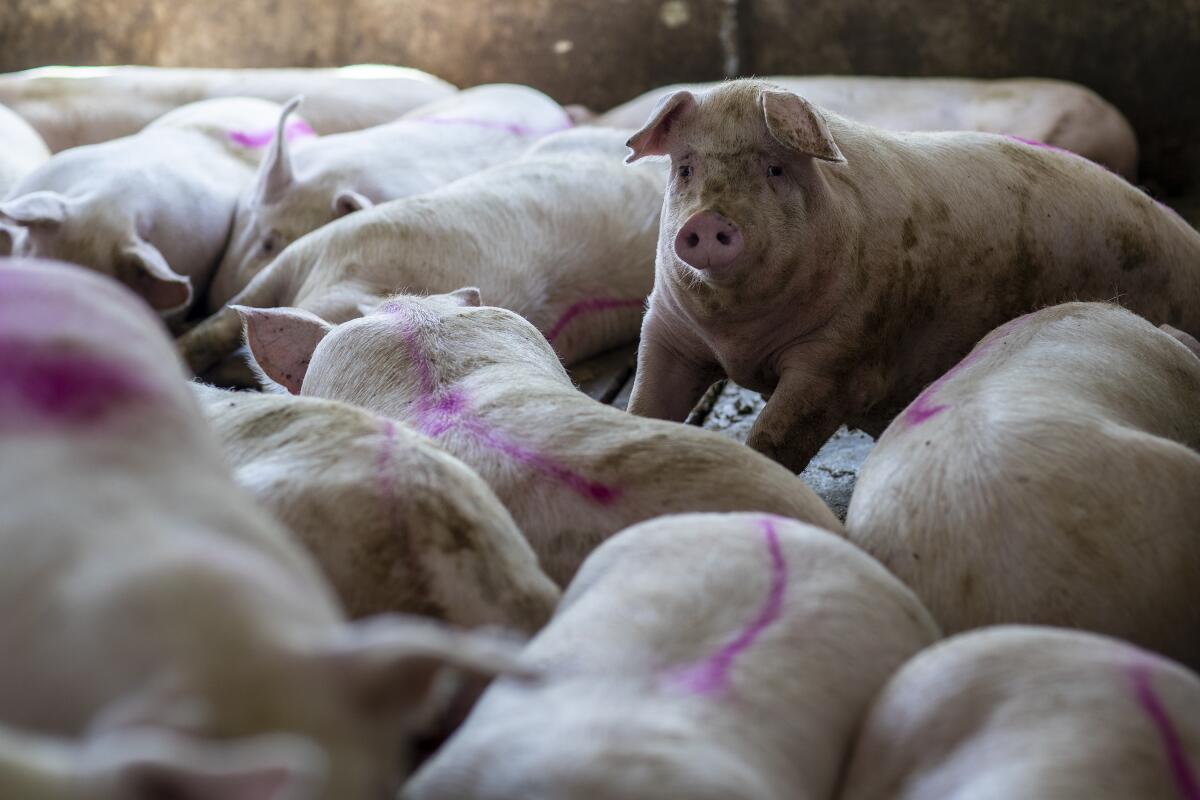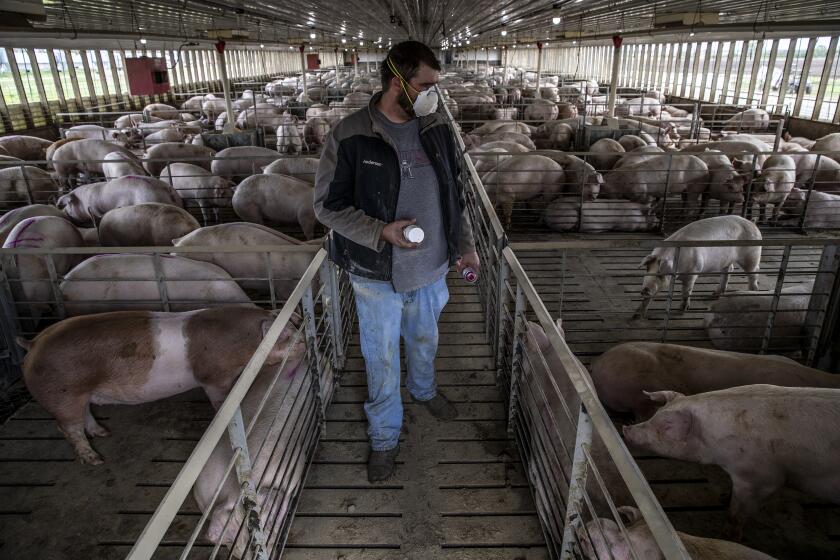Op-Ed: The pork industry should stop squealing about complying with a law passed in 2018

Some in the pork industry are warning that California residents may soon experience a significant shortage of the meat — and what will be available may be priced significantly higher than it is now. Beginning in 2022, pork producers will have to abide by Proposition 12, a California farm animal cruelty law passed in 2018 that introduces minimum space requirements for veal calves, egg-laying hens and breeding pigs. But do the pork industry’s dire predictions make sense?
To comply with the law, pork producers must ensure that the spaces confining breeding pigs and their offspring are no less than 24 square feet. Claims of the sky falling when it comes to pork production are an attempt by industrial farms to save money by keeping pigs in cages so small that the animals can’t move more than a few inches, let alone turn around during their entire four-year life. When it was on the ballot, animal advocacy organization PETA actually opposed the proposition for not being severe enough.
Proposition 12 also applies to the egg and veal industries. But although they were initially opposed to the proposition, they have complied with the law — only the pork sector is fearmongering about a commercial disaster. To be sold in California, products from pig farms must be up to the new standards, regardless of where they were produced. The industry claims that as a result of these requirements the state’s pork supply could fall dramatically, and bacon prices could spike by as much as 60%.
Economists have estimated that complying to the new standards could raise costs to pig farmers by 15% per animal. That relatively small cost increase for pork producers now threatens to hit consumers with a much more significant price spike. But rather than preparing to meet the new standards three years ago, like most veal and egg producers did, a vocal segment of pork producers decided that they’d rather drag their feet.
Not all pork producers are raising objections about this law. Companies such as Niman Ranch, Coleman Natural and Hormel have publicly stated they are ready to provide pork for the California marketplace under the new rules.
Requiring more space for breeding pigs is the least we can do, given the horrific practices of industrialized animal agriculture. Industrial pork operations squeeze pigs into extremely limited spaces that can prevent them from simply stretching their limbs. These conditions can cause immense suffering and physical breakdown of the animals’ bodies, increasing the risk of illness and disease.
Representatives of the pork industry are defending a practice that voters found indefensible — Californians overwhelmingly approved Proposition 12, which earned the support of nearly two out of every three voters. But instead of respecting the people’s decision, the industry has been fighting —and losing — in the courts. In July, the 9th U.S. Circuit Court of Appeals upheld a lower court ruling in favor of the law. The National Pork Producers Council and the American Farm Bureau Federation had filed a claim saying the legislation violated the Commerce Clause, which says states cannot unduly burden interstate commerce. The panel of judges found, among other things, that the impact of Proposition 12 was indirect and did not violate the Commerce Clause.
As the pork industry appeals to Gov. Gavin Newsom directly, hoping that he will delay the law from going into effect at the start of 2022, they’ve wasted three years when they could have prepared to comply with the legislation. Saying “we need more time” now is cynical and dishonest, not to mention that Newsom doesn’t have legal authority to delay the law’s implementation.
Nothing about Proposition 12 targets pork producers unfairly or disproportionately. Egg and veal farms met the January 2020 deadline this legislation required of their industries, and egg farms are prepared to meet an additional provision that goes into effect in 2022. Pork producers can and should meet their 2022 requirements without all the squealing.
The more this sector disingenuously fights an animal cruelty law voted for by people who eat their product, the more it shows that the strongest reason to leave pork off our plates may be the actions of the industry itself.
Editorial: If bacon costs more next year, blame the pork producers, not the law treating pigs better
Instead of complaining about a coming law giving gestating sows more space, pork producers should have been working on complying with it.
Brian Kateman is president and co-founder of the Reducetarian Foundation, which works to reduce societal consumption of animal products. His documentary “Meat Me Halfway” was released last month.
More to Read
A cure for the common opinion
Get thought-provoking perspectives with our weekly newsletter.
You may occasionally receive promotional content from the Los Angeles Times.











